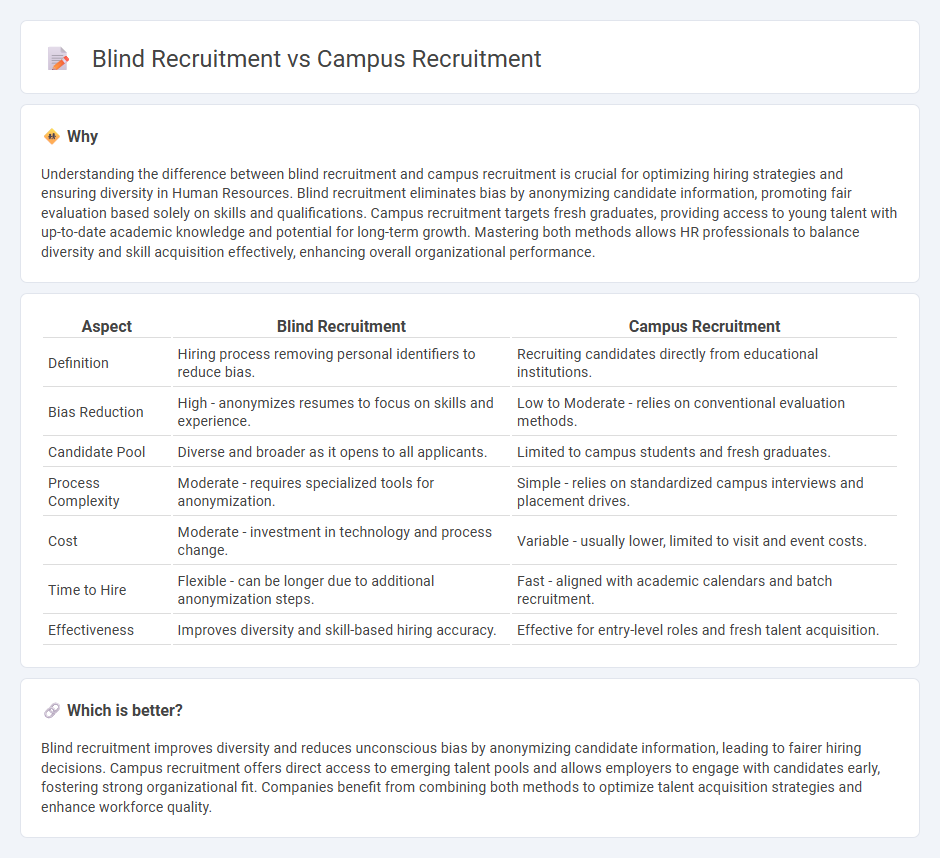
Blind recruitment eliminates biases by anonymizing candidate information, focusing solely on skills and qualifications to enhance diversity and fairness in hiring. Campus recruitment targets fresh graduates directly from educational institutions, providing companies access to a pool of young, educated talent poised for entry-level roles. Explore the advantages and challenges of both methods to optimize your hiring strategy.
Why it is important
Understanding the difference between blind recruitment and campus recruitment is crucial for optimizing hiring strategies and ensuring diversity in Human Resources. Blind recruitment eliminates bias by anonymizing candidate information, promoting fair evaluation based solely on skills and qualifications. Campus recruitment targets fresh graduates, providing access to young talent with up-to-date academic knowledge and potential for long-term growth. Mastering both methods allows HR professionals to balance diversity and skill acquisition effectively, enhancing overall organizational performance.
Comparison Table
| Aspect | Blind Recruitment | Campus Recruitment |
|---|---|---|
| Definition | Hiring process removing personal identifiers to reduce bias. | Recruiting candidates directly from educational institutions. |
| Bias Reduction | High - anonymizes resumes to focus on skills and experience. | Low to Moderate - relies on conventional evaluation methods. |
| Candidate Pool | Diverse and broader as it opens to all applicants. | Limited to campus students and fresh graduates. |
| Process Complexity | Moderate - requires specialized tools for anonymization. | Simple - relies on standardized campus interviews and placement drives. |
| Cost | Moderate - investment in technology and process change. | Variable - usually lower, limited to visit and event costs. |
| Time to Hire | Flexible - can be longer due to additional anonymization steps. | Fast - aligned with academic calendars and batch recruitment. |
| Effectiveness | Improves diversity and skill-based hiring accuracy. | Effective for entry-level roles and fresh talent acquisition. |
Which is better?
Blind recruitment improves diversity and reduces unconscious bias by anonymizing candidate information, leading to fairer hiring decisions. Campus recruitment offers direct access to emerging talent pools and allows employers to engage with candidates early, fostering strong organizational fit. Companies benefit from combining both methods to optimize talent acquisition strategies and enhance workforce quality.
Connection
Blind recruitment enhances campus recruitment by eliminating biases related to gender, ethnicity, or background during the initial screening of graduates, fostering diversity in hiring. This approach ensures that campus recruitment focuses solely on candidates' skills, qualifications, and potential rather than extraneous factors. Integrating blind recruitment techniques in campus hiring processes results in more equitable talent acquisition and promotes inclusive workforce development.
Key Terms
Talent Pipeline
Campus recruitment targets fresh graduates by building a direct talent pipeline with universities, ensuring a steady influx of qualified candidates familiar with industry standards. Blind recruitment removes bias by anonymizing candidate information, promoting diversity and inclusion within the talent pipeline. Explore how integrating both methods can optimize your hiring strategy and strengthen your talent pipeline.
Diversity Hiring
Campus recruitment targets fresh graduates from specific universities, often limiting diversity by favoring familiar academic backgrounds. Blind recruitment anonymizes candidate information, reducing biases related to gender, ethnicity, and age, thus enhancing diversity hiring outcomes. Explore how integrating these recruitment methods can optimize your organization's diversity strategy.
Unconscious Bias
Campus recruitment often relies on prestigious university credentials, which can reinforce unconscious bias by favoring candidates from certain institutions or backgrounds. Blind recruitment removes personal information such as names and educational history, promoting a fairer evaluation based solely on skills and experience, reducing the impact of unconscious bias. Explore how these recruitment methods shape diversity and inclusion in the workplace.
Source and External Links
Everything You Need to Know About Campus Recruitment - Campus recruitment is a strategy for sourcing, engaging, and hiring young talent for internships and entry-level positions, focusing on year-round student engagement and building a talent community by connecting with university career centers and referrals from recent grads.
What is campus recruitment? - Yello - Campus recruitment involves in-person and virtual methods of connecting with college students through career fairs, information sessions, and digital communications to attract young talent, commonly used by medium to large companies, especially in industries like finance, tech, and engineering.
20 Creative Campus Recruitment Strategies You Need to ... - Effective campus recruitment strategies include participating in campus events, collaborating with student organizations, building relationships with career services, and engaging specific academic departments to connect with students based on their interests and career goals.
 dowidth.com
dowidth.com